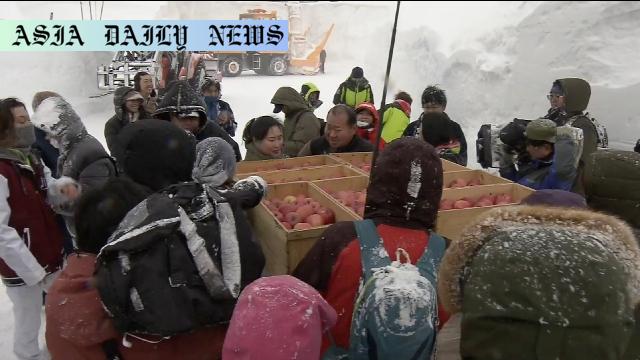Apples are enhanced through a two-month snow storage process in Japan, offering a sweeter and fresher taste for consumers nationwide.

The Unique Snow Storage Process for Apples
In the picturesque highlands of Japan’s Aomori Prefecture, a remarkable tradition takes place that highlights the ingenuity of fruit preservation. Sun Fuji apples, known for their radiant red color and sweetness, are stored under snow accumulated in the Hakkoda mountain range. At an altitude of 750 meters, temperatures remain consistently low, and humidity is constant—optimal conditions to naturally enhance the apples’ flavor.
Over the course of two months, the apples rest beneath layers of snow that can reach depths of more than four meters. This controlled environment causes subtle yet powerful chemical changes in the fruit, breaking down starches into sugars and resulting in an immensely sweeter taste. Unlike controlled artificial environments, this traditional method carries a natural appeal, connecting the process to the region’s ecological roots.
Bringing the Community Together
The snow storage process is not merely a method of enhancing flavor; it is a celebration of community and culture. Each year, locals and tourists gather in Aomori to unearth these hidden treasures. Participants armed with shovels and the occasional use of heavy machinery uncover crate after crate of pristine fruit. The joy of retrieving these specially preserved apples resonates with the communal spirit, offering a unique hands-on experience to visitors.
One highlight of the event is the opportunity to taste the apples fresh from their snowy resting place. Attendees regularly describe the flavor as sweeter and crisper compared to traditionally stored fruit. Such feedback reinforces the success of this age-old preservation technique in meeting modern taste expectations.
The Journey from Mountain to Markets
Following the annual event, the apples are distributed to supermarkets across Japan, ensuring that consumers nationwide can enjoy this seasonal delicacy. The timing aligns perfectly with the end of winter, as fresh, sweetened apples serve as a harbinger of spring. This distribution also helps build recognition for Aomori Prefecture as a hub of agricultural innovation, supporting local farmers and enhancing regional tourism.
Impacts Beyond Taste
The snow storage tradition extends beyond the culinary experience. It contributes significantly to sustainable practices by reducing the need for artificial refrigeration and utilizing the natural environment as a preservation tool. Moreover, events like these fuel interest in agritourism, attracting visitors from across Japan and even internationally. By combining agricultural innovation with cultural engagement, Aomori has created a model for other regions to emulate.
The sweetness of Sun Fuji apples embodies more than just flavor—it represents the harmony between nature, community, and tradition. As such, this unique practice from Aomori serves as a remarkable example of how agricultural practices can merge science and culture to create something truly extraordinary.
Commentary
The Charm of Snow-Stored Apples
The story of snow-stored apples from Aomori Prefecture offers much more than an exploration of innovative agricultural practices—it brings to light the beauty of tradition and the endless possibilities when nature and science unite. Reading about this process, one cannot help but admire how an age-old method continues to thrive in modern times, bringing smiles to countless consumers.
Cultural and Scientific Harmony
What strikes me most about this practice is the gentle interplay between culture and natural science. By harnessing the natural conditions of the Hakkoda mountain range, farmers have created an environmentally friendly approach to fruit preservation. This not only enhances the sweetness but also emphasizes sustainability, which is a vital message in today’s environmentally conscious world.
A Community Effort
The annual communal gathering to dig out the snow-stored apples is heartwarming. It reminds me of how food, at its core, has the profound ability to bring people together. Whether locals, tourists, or farmers, everyone shares a role in this unique tradition, fostering bonds within the community and beyond. Experiences like these make travel unforgettable, offering more than just a taste but also a memory.
Overall, the Aomori snow-stored apple tradition is an inspiring tale of innovation and connection. It stands as a testament that age-old techniques, when properly preserved, can create extraordinary results while enriching communities, inspiring sustainability, and delivering unparalleled flavor.


